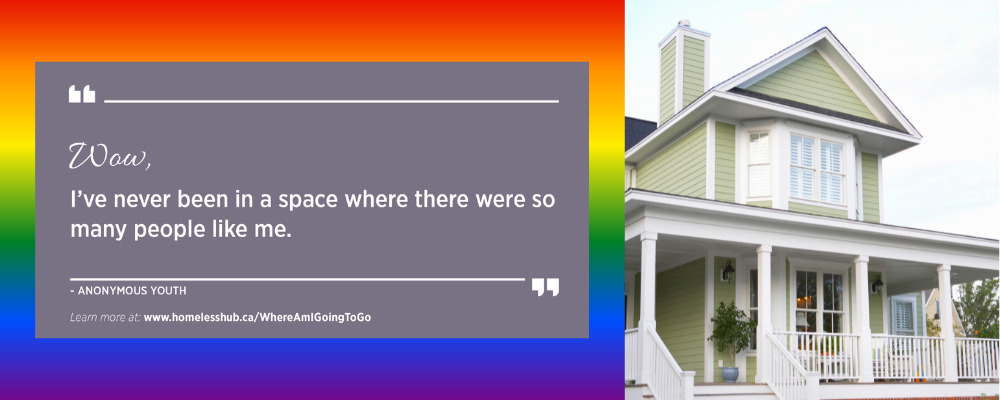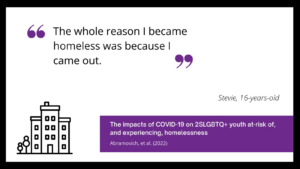
Queer-Informed Housing for 2SLGBTQ+ Youth and Young Adults
29 Jun 2023
Guest Author
This past April, the 2023 CHRA National Congress featured an amazing lineup of sessions that delved into some of the biggest issues facing Canada’s housing and homelessness sector. Speakers Alex Abramovich, Research Scientist, Institute for Mental Health Policy Research at the Centre for Addiction and Mental Health (CAMH); Andrew Hartman, Founder, Psystem & Project Leader, University of Saskatchewan; and Jennifer White, General Manager, Youth Outreach and Intervention at the YMCA of Greater Toronto joined us to discuss the specific housing needs of 2SLGBTQIA+ youth and young adults. Read on to learn more.
Building an understanding of 2SLGBTQIA+ youth & young adult homelessness
Alex Abramovich, Research Scientist, CAMH and Assistant Professor, University of Toronto
In recent years, all levels of government have shown an increased interest in understanding experiences of 2SLGBTQIA+ individuals related to health, housing, and homelessness across Canada. 2SLGBTQIA+ youth are disproportionately represented among those experiencing homelessness, representing 25-40% of the homeless youth population. Family conflict over 2SLGBTQIA+ identity is the most common pathway into homelessness among queer and trans youth.
Peer support is lifesaving for 2SLGBTQIA+ youth experiencing homelessness. Over the past 8 years, a small number of population-based housing programs including supportive housing, transitional housing, and host homes, all designed to meet the specific needs of 2SLGBTQIA+ youth have opened in Canada. However, these programs have seen few rigorous evaluations to date. More program evaluations are necessary to provide hard data on the efficacy of these programs to policy- and decision-makers.
Through surveys, residents expressed that living in a 2SLGBTQIA+ household (in this case, YMCA Sprott House, Toronto, Ontario) had given them a sense of belonging and community that they had never before experienced. After a year of living at Sprott House, unemployment rates decreased while school enrollment rates increased among residents. Youth valued the opportunity to connect with Sprott House staff who in many cases also identified as 2SLGBTQIA+ and shared their lived experiences. Staff described feeling appreciative of the safe and affirming space Sprott House created for residents.
Population-based housing programs are a critical part of the solution, but they cannot solve all the issues faced by 2SLGBTQIA+ youth; all housing programs and organizations must do the work to truly become safe, inclusive, and affirming spaces for all youth. To accomplish this, housing providers must engage with 2SLGBTQIA+ youth to understand their needs, provide mandatory 2SLGBTQIA+ inclusion training for staff, and develop services that foster an intersectional approach to housing and services.
Pride Home: OUTSaskatoon’s 2SLGBTQIA+ long-term youth group home
Andrew Hartman, Founder, Psystem & Project Leader, University of Saskatchewan
OUTSaskatoon provides provides 2SLGBTQIA+ inclusive and informed supports and services including counselling, a drop-in space, educational workshops, and drop-in programs for a variety of demographics, and housing for queer and trans youth in Saskatoon and surrounding area. OUTSaskatoon opened Pride Home, Canada’s first 2SLGBTQIA+ long-term group home for youth aged 16-21, in 2017.
Pride Home is a 6-bedroom housing program with private bathrooms and a shared kitchen, living room, and backyard. It operates on an independent supported living model—residents have access to supports but do not require them 24/7.
Residents have a lease agreement with a professional property management company, which acts as a private partner to Pride Home. The youth pay a deposit, rent, and their share of the utilities as they would in a fully independent shared home. Residents cover their rent in a variety of ways: through the Ministry of Social Services (if they are 16-17 and attending school), the Social Assistance Program (18+), Saskatchewan Assistance Insurance for Disability, through their own employment, or with family assistance.
The guiding principles of Pride Home’s programming are that it is: youth-led, based on harm reduction principles, informed by feminist and queer-positive thinking, and is decolonized and anti-racist. Day-to-day supports include peer support, programming, shopping, cooking, cleaning, transportation, system navigation, and self-management. Residents are required to work collaboratively with staff to create a case plan to help them meet their desired goals, whether they be employment-based, educational, health-related, family-related, or recovery-related.
The youth-centred approach helps residents learn how to understand voice their own needs. Youth living in Pride Home benefit from the development of relationships with one another and staff, which helps to repair social ruptures and build a support system within the home and the community. The skills they learn and supports they receive at Pride Home ultimately help residents to successfully live independently in their community.
YMCA Sprott House - Toronto’s First 2SLGBTQIA+ Transition-to-Housing Shelter
Jennifer White, General Manager, Youth Outreach and Intervention at the YMCA of Greater Toronto
YMCA Toronto’s Sprott House, which opened in 2016, is one of the first 2SLGBTQIA+ transitional housing programs for youth in Canada. It offers 25 single occupancy rooms with individual washrooms, beds, desks & mini fridges, 24/7 staff support, two shared kitchens, a lounge, and a backyard with a seating area, garden, and barbeque. Its program design was influenced by Housing First for Youth & Foyer models, which emphasize longer stays, coordinated supports, community connections, and more.
Sprott House provides rent-free housing and supports for 12-24 months (with possible extensions on a case-by-case basis), 2SLGBTQIA+ specific programming, a judgement-free space, support in navigating safety in other institutions, and connection to 2SLGBTQIA+ communities to help foster a sense of belonging.
Practical supports provided at Sprott House include case management, social, recreational, and arts-based programming, life skills development, group and community processes, advocacy and informed referrals, and support related to substance use and sexual health, mental and physical health, and employment and financial literacy.
YMCA Toronto is currently exploring the opportunity to develop affordable transitional housing for 2SLGBTQIA+ young people at Wagner Green YMCA. This new facility will build a six-storey addition onto the existing building with an interior connection and will offer 31 residential units, one of which will be for a peer mentor/superintendent. Clients will be eligible for up to a four-year stay to the age of 29.
The proposed development and related programs and services will draw on available government programs related to housing/homelessness, addressing a gap in services (housing and programming) for 2SLGBTQIA+ youth and young adults. Clients will receive access to low-barriered wraparound supports that facilitate stable tenancies and independent living for an underserved population, empowering residents to be successful tenants.
Addressing the unique needs of 2SLGBTQIA+ youth and young adults is a critical component in the goal to eliminate youth homelessness in Canada; creating safe and inclusive spaces, programs, and services is a vital component of this work. Though population-based housing programs for2SLGBTQIA+ youth are relatively recent developments, early evaluations are showing their necessity. Programs such as Pride Home and Sprott House can serve as models for housing and shelter providers across Canada.
This post was written in collaboration with session speakers Alex Abramovich, Andrew Hartman, and Jennifer White.
